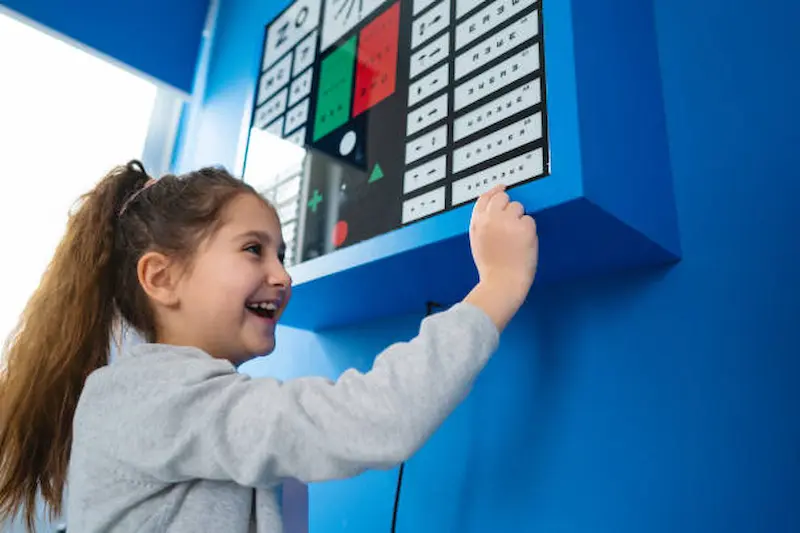Day trading involves buying and selling financial instruments within the same trading day to profit from short-term price movements. It’s a fast-paced form of trading that requires careful analysis and quick decision-making. Day trading can captivate kids due to its dynamic nature and potential for financial gains. It offers a real-world application for math and analytical skills, making it an intriguing way for young minds to engage with finance and entrepreneurship. However, parental guidance and education on risks are essential for a safe and responsible introduction to day trading.
In this blog, you’ll gain valuable insights into the exciting world of day trading, where quick decisions can lead to significant profits.
Table of contents
- Getting Started with Day Trading
- How Day Trading Works
- Setting Up Your Day Trading Account
- Analyzing Stocks
- Risk Management in Day Trading:
- A Day in the Life of a Kid Day Trader:
- Tips for Successful Day Trading
- Pros and Cons of Day Trading for Kids
- Legal and Parental Considerations
- Day Trading Lingo
- Day Trading Simulators for Practice:
- Conclusion
- Frequently Asked Questions ( FAQs )
Getting Started with Day Trading

A. Understanding the Stock Market
To embark on a successful day trading journey, it’s crucial to comprehend the inner workings of the stock market. Understand market orders, limit orders, and the bid-ask spread. Familiarize yourself with stock charts, candlestick patterns, and technical analysis. This foundational knowledge will empower you to make informed trading decisions.
B. What Tools Do You Need?
Efficient day trading requires essential tools:
- Computer: A reliable computer is your trading command center. It should be fast, with ample processing power to handle real-time data feeds and trading software.
- Internet Connection: A high-speed, stable internet connection is non-negotiable for executing trades swiftly and avoiding disruptions.
- Trading Platform: Choose a user-friendly trading platform that aligns with your trading strategy and offers essential tools like real-time data, charting, and order execution capabilities.
These tools are the backbone of your day trading setup, ensuring you can react promptly to market fluctuations and seize profitable opportunities.
How Day Trading Works

A. Buying and Selling Stocks
Day traders execute quick buy and sell orders in pursuit of profit. They capitalize on small price fluctuations, often holding positions for minutes or hours. To succeed, choose liquid stocks with ample trading volume, as these offer tighter bid-ask spreads and greater trading opportunities.
B. Short-Term vs. Long-Term Trading
Day trading differs from long-term investing. While day traders seek short-term gains, long-term investors hold assets for years, focusing on fundamentals.
Day trading demands constant attention, while long-term investing benefits from a more relaxed approach, aligned with financial goals and risk tolerance.
Setting Up Your Day Trading Account
A. Choosing a Broker
Selecting the right broker is crucial for day trading success. Look for one that offers low commissions, a user-friendly trading platform, and access to the markets you want to trade. Ensure they provide the necessary tools and research resources to support your trading strategy.
B. Opening an Account
To open a day trading account, you’ll need to complete the broker’s application process. This typically involves providing personal information, verifying your identity, and agreeing to the terms and conditions. It’s similar to the process of opening a bank account for kids, where guardians are responsible for the child’s financial activities until they reach a certain age and can manage their accounts independently.
C. Depositing Money
After your account is approved, deposit funds to start trading. Ensure you have enough capital to meet margin requirements and manage risk effectively. It’s advisable to start with a reasonable amount and gradually increase your investment as you gain experience.
Analyzing Stocks

Analyzing stocks is fundamental in day trading. Key aspects include studying historical price data, assessing company financials, and using technical indicators. Technical analysis involves chart patterns, moving averages, and momentum indicators to predict price movements. Fundamental analysis focuses on a company’s financial health, examining factors like earnings reports and news events. Successful day traders often combine both approaches to make informed decisions and increase their chances of profitable trades.
Risk Management in Day Trading:
Effective risk management is paramount in day trading, and it’s an important lesson in critical thinking skills for kids. Traders must set strict stop-loss orders to limit potential losses and employ proper position sizing to safeguard their capital. Diversification across different assets or markets can help spread risk. Additionally, having a well-defined trading plan, sticking to it, and avoiding emotional decisions are essential components of successful risk management. In the volatile world of day trading, protecting your investments is as crucial as seeking profitable opportunities, ensuring longevity and sustainability in this fast-paced trading strategy.
A Day in the Life of a Kid Day Trader:

A. Morning Routine:
For young day traders, a disciplined morning routine is key. It starts with thorough market research and news analysis. Setting achievable daily goals and reviewing previous trades helps establish a focused mindset.
B. Making Trades:
Executing trades demands precision. Kids should stay informed about market trends, employ risk management strategies, and choose assets wisely. Constant monitoring and quick decision-making are vital skills.
C. Tracking Your Progress:
Keeping a trading journal to record wins, losses, and lessons learned is invaluable. Regularly reviewing your progress helps refine strategies and improve as a young day trader, fostering long-term success.
Tips for Successful Day Trading
A. Stay Informed
Continuously educate yourself about the financial markets. Keep up with news and events that can impact your trading assets. Informed decisions are key to success in day trading.
B. Control Your Emotions
Emotions like fear and greed can lead to impulsive actions and losses. This is an important aspect of day trading, and it’s also valuable parenting advice. Parents can teach their children the significance of emotional discipline not only in trading but in life in general.
C. Practice Patience
Day trading can be fast-paced, but patience is a virtue. Wait for the right opportunities and avoid overtrading. Patience helps you make more calculated, less risky trades.
Pros and Cons of Day Trading for Kids

Day trading for kids presents both opportunities and challenges.
Pros:
- Financial Education: Day trading can provide kids with an early financial education, making it a valuable tool for teaching financial literacy. They can learn about budgeting, saving, and investing, which are vital life skills.
Parents can use day trading as an opportunity to impart financial education for kids, helping them develop a strong foundation in understanding money management and making informed financial decisions for the future.
- Potential Earnings: Successful trades can lead to profits, offering children an opportunity to save or invest their earnings for the future.
- Discipline: Day trading instills discipline and emotional control. It teaches kids to make rational decisions and stick to a strategy, which can benefit them in various aspects of life.
- Entrepreneurial Spirit: It fosters an entrepreneurial spirit, encouraging kids to take initiative and explore the world of finance.
Cons:
- Risk: The stock market carries inherent risks. Kids may experience losses, and it’s important they understand that investments can go down in value.
- Time-Consuming: Day trading demands substantial time and attention. This can be challenging for kids as it may interfere with their schoolwork and extracurricular activities.
- Legal Age: Kids typically need to meet legal age requirements to open trading accounts, which vary by region. This means they might need parental involvement, and parents should consider the legal implications.
- Stress: The pressure and stress associated with day trading may not be suitable for all kids, potentially impacting their mental and emotional well-being. It’s essential for parents to prioritize stress management for kids, ensuring that their child can cope with the demands and uncertainties of day trading while maintaining their overall health and well-being.
In conclusion, day trading for kids can be a valuable learning experience, but it should be approached with caution. Parents and guardians should provide guidance, ensure legal compliance, and help kids strike a balance between their education and trading activities. It’s important to prioritize a child’s overall well-being and financial education while mitigating the risks associated with day trading.
Legal and Parental Considerations

A. Parental Consent
Before a child engages in day trading, parental consent is crucial, especially if they are underage. Positive parenting plays a vital role here, as parents should fully understand the implications and risks involved in day trading, ensuring their child’s readiness for this financial endeavor. They can also oversee and guide their child’s trading activities, maintaining a responsible and educational approach.
B. Taxes and Day Trading
Parents should educate their child about the tax implications of day trading, which is also a valuable lesson in good financial habits for kids. Gains from day trading are typically subject to capital gains tax, and understanding tax obligations is essential to avoid legal issues in the future.
Consulting with a tax professional can provide valuable guidance in managing tax liabilities associated with day trading. This early exposure to financial responsibility can instill good habits for kids, setting them on a path to financial literacy and responsible money management.
Day Trading Lingo
A. Common Terms:
Day trading comes with its unique language. Understanding common terms like “bullish,” “bearish,” “volatility,” and “moving averages” is essential. These terms help traders analyze market trends and make informed decisions.
B. Slang Words:
In the fast-paced world of day trading, slang words like “FOMO” (Fear of Missing Out), “bagholder,” “pump and dump,” and “whale” are often used. Familiarizing yourself with these expressions can help you navigate the trading community and stay ahead of the game.
Day Trading Simulators for Practice:

Day trading simulators are invaluable tools for aspiring traders, and they’re also excellent activities for kids. These virtual platforms allow users to practice trading strategies with virtual money, replicating real market conditions. They provide an ideal environment to hone trading skills, test new approaches, and gain confidence without risking real capital. Simulators offer features like historical data, real-time charts, and order execution, enabling traders to refine their decision-making processes. Whether you’re a beginner or a seasoned trader, utilizing a simulator can significantly enhance your trading proficiency and boost your chances of success in the competitive world of day trading.
Conclusion
Day trading involves buying and selling financial assets within the same trading day, aiming to profit from short-term price movements. It allows traders to capitalize on intraday price fluctuations in various markets, providing opportunities for quick gains. Moreover, day trading offers flexibility and independence, as traders can work from anywhere with an internet connection. However, it’s important to note that day trading also carries significant risks, and success requires a solid understanding of markets, disciplined strategies, and effective risk management.
To get your hands on more educational and free resources on coding for kids, robotics for kids, financial education for kids, etc., do check out the BrightCHAMPS Page now!
To get your hands on more such articles, educational content, and free resources on coding for kids, robotics courses, game development, etc., check out the BrightCHAMPS Blog Page now!
Frequently Asked Questions ( FAQs )
A1. Day trading shares similarities with gambling due to the speculative nature and risk involved.
Q2. Can kids be successful day traders?
A2. It’s generally not advisable for kids to engage in day trading due to its complexity and risk.
Q3. How much money do I need to start day trading?
A3. The amount needed to start day trading varies but often requires a significant capital investment.
Q4. What happens if I lose all my money?
A4. If you lose all your money in day trading, you may incur substantial financial losses.
Q5. Is day trading a full-time job?
A5. Day trading can be a full-time job, but it’s demanding and volatile.
Q6. Are there any age restrictions for day trading?
A6. Age restrictions for day trading depend on local regulations, often requiring individuals to be at least 18 or 21 years old.


 We are an army of educators and passionate learners from BrightChamps family, committed to providing free learning resources to kids, parents & students.
We are an army of educators and passionate learners from BrightChamps family, committed to providing free learning resources to kids, parents & students.












